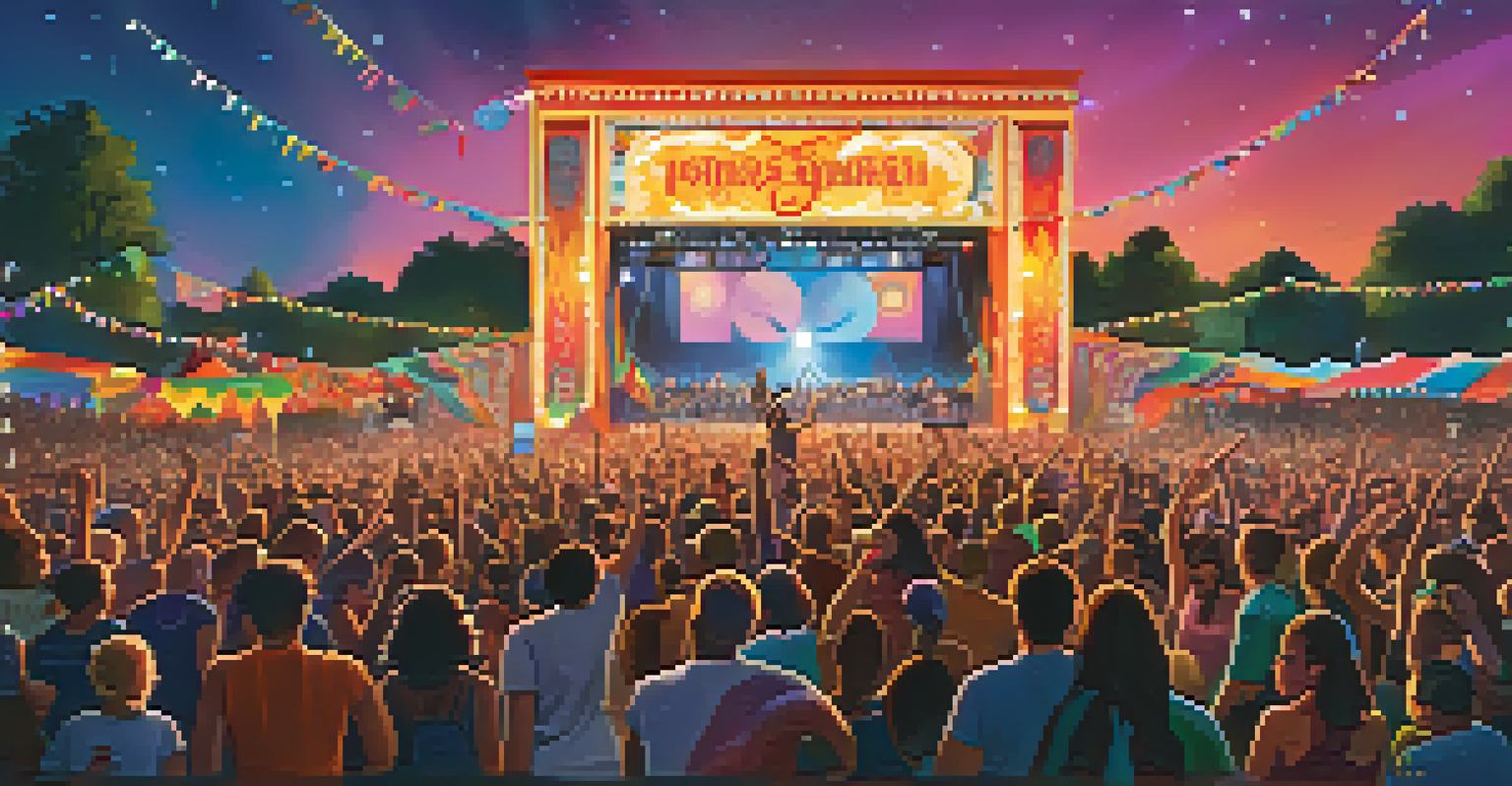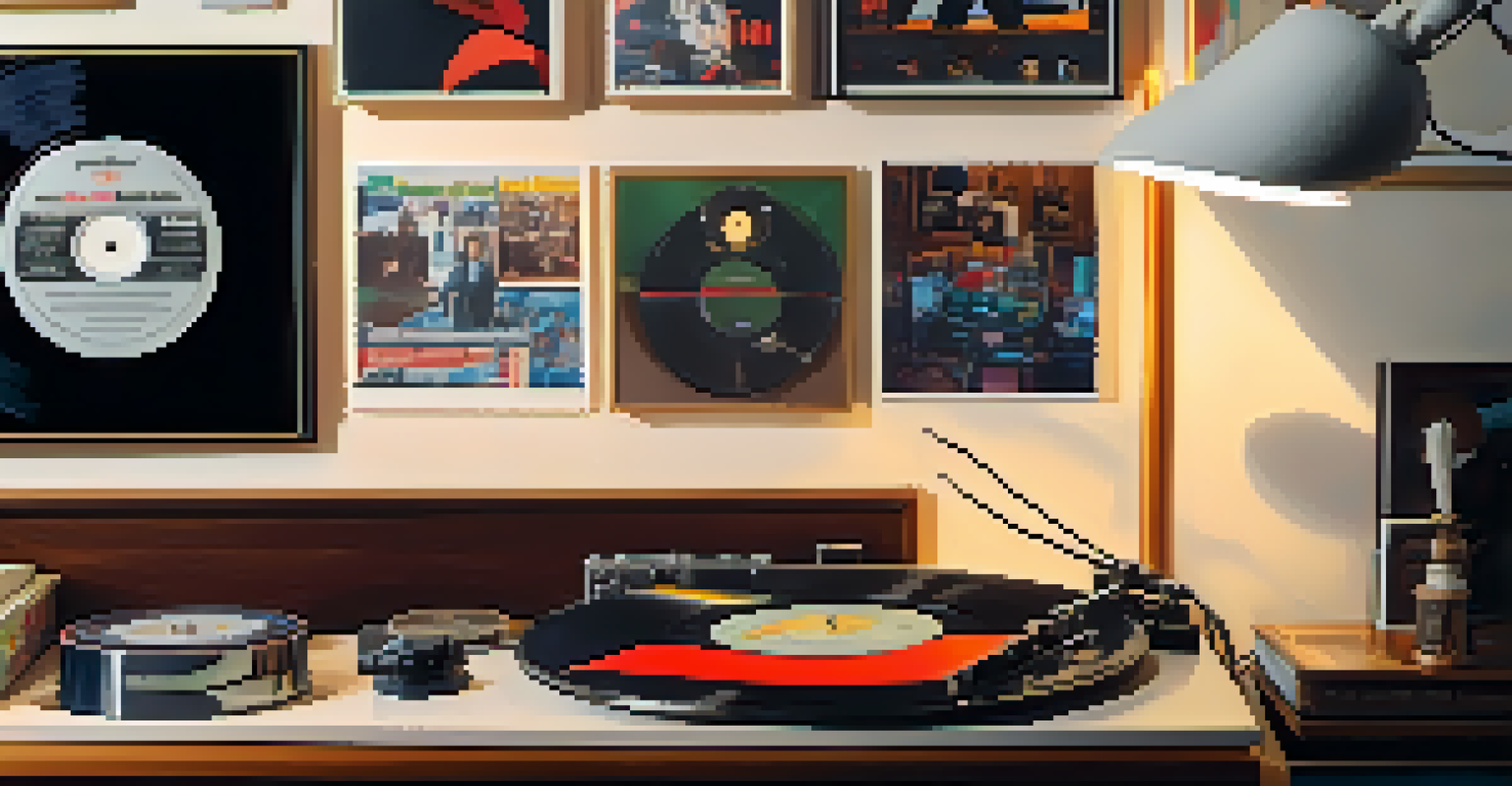The Function of Music Critics in the Industry Today

Understanding the Role of Music Critics in the Industry
Music critics serve as the bridge between artists and audiences, providing insights and evaluations of musical works. They analyze everything from lyrical content to production quality, helping listeners navigate the vast landscape of music available today. Their reviews can elevate an artist’s profile or challenge listeners to think critically about what they consume.
Music is the shorthand of emotion.
In an era of information overload, critics help filter out noise, highlighting standout artists and albums that deserve attention. This curation process is essential for both casual listeners and dedicated fans, offering guidance in a world overflowing with choices. Ultimately, critics play a crucial role in shaping musical taste and trends.
Moreover, their assessments can generate meaningful discussions about the music itself, culture, and the industry at large. By articulating thoughts on music, critics not only influence listener preferences but also provoke conversations that might not happen otherwise.
Music Critics as Cultural Commentators
Beyond just reviewing albums, music critics often act as cultural commentators, reflecting on society's values through the lens of music. They explore how songs and artists resonate within the context of current events and societal changes, offering deeper meaning to their audience. This role is particularly significant in today's climate where music frequently intersects with activism and social movements.

For instance, when an artist releases a politically charged song, critics can provide context and interpretation that enrich the listener's understanding of the work. This commentary not only enhances appreciation but also encourages listeners to engage with the music on a more intellectual level. Critics, therefore, help elevate music from mere entertainment to a form of cultural expression.
Critics Shape Music Trends
Music critics provide essential insights that help audiences navigate the vast music landscape, influencing trends and preferences.
As they navigate these complex themes, critics can also challenge the status quo, pushing both artists and audiences to reconsider their perspectives. By doing so, they foster a dynamic dialogue about the role of music in shaping and reflecting societal issues.
The Impact of Digital Platforms on Music Criticism
The rise of digital platforms has transformed how music criticism is consumed and produced. Blogs, social media, and streaming services have democratized the field, allowing anyone with an internet connection to share their opinions. This shift has led to a more diverse array of voices, but it also raises questions about credibility and expertise.
Without music, life would be a mistake.
While traditional critics often have backgrounds in journalism or musicology, digital platforms allow amateur reviewers to reach wide audiences. This can be empowering, but it can also lead to misinformation or overly simplistic assessments of complex works. As a result, the landscape is a mix of professional criticism and casual commentary, requiring listeners to discern the quality and reliability of the sources they choose to trust.
Nonetheless, established critics have adapted by utilizing these digital platforms to expand their reach and engage with audiences directly. By embracing social media and streaming services, they can connect with fans in real-time, fostering a community around shared musical interests.
Challenges Facing Music Critics Today
Despite their important role, music critics face several challenges in the current landscape. The rapid pace of the digital world often demands quick takes on new releases, which can compromise the depth and quality of their analysis. Critics may feel pressured to produce content swiftly to remain relevant, sometimes leading to less thorough reviews.
Additionally, the decline of traditional music publications has reduced opportunities for critics to publish longer, in-depth pieces. Many critics are now freelancers, which can create instability and limit their ability to dedicate time to thoughtful critique. This shift may result in a focus on quantity over quality, which ultimately affects the richness of music criticism.
Digital Platforms Transform Critique
The rise of digital platforms has democratized music criticism, allowing diverse voices to emerge while challenging traditional credibility.
Moreover, the rise of algorithms determining what music listeners see can overshadow traditional critical voices. As streaming platforms curate playlists based on user data, the unique perspectives of critics may struggle to break through the noise, challenging their influence in the industry.
The Relationship Between Critics and Artists
The relationship between music critics and artists is often complex and multifaceted. On one hand, artists rely on critics to amplify their work and reach broader audiences; on the other hand, critics hold the power to either elevate or diminish an artist's reputation. This dynamic can create tension, especially when a review is less than favorable.
Many artists view criticism as an essential part of their growth, taking feedback to hone their craft. Critics can provide valuable insights that challenge artists to push boundaries and innovate. In a way, this relationship fosters mutual respect, even amidst potential disagreements over artistic choices.
Ultimately, the best critics approach their work with an understanding of the artist's intent and the broader context, creating a dialogue rather than a monologue. This collaborative spirit can lead to a richer musical environment where both critics and artists thrive.
The Future of Music Criticism
As we look ahead, the future of music criticism is likely to evolve alongside technological advancements and shifts in cultural consumption. With the ongoing rise of artificial intelligence and machine learning, we might see new ways to analyze music and trends, potentially changing how critics approach their craft. However, human insights remain irreplaceable; the emotional depth and nuanced understanding that critics provide are vital.
Moreover, the growing emphasis on diversity and representation in music is likely to influence criticism as well. As more underrepresented voices gain visibility in the music industry, critics will need to adapt their perspectives to reflect this diversity authentically. This evolution could lead to a richer tapestry of musical commentary that resonates with a broader audience.
Artists Grow Through Criticism
The relationship between critics and artists fosters growth, as constructive feedback can inspire artists to innovate and refine their craft.
In the end, while the landscape of music criticism will continue to change, its fundamental purpose will remain: to foster deeper connections between artists and audiences, guiding listeners through the ever-expanding world of music.
How to Engage with Music Critics Effectively
Engaging with music critics can enhance your listening experience and deepen your understanding of music. One way to start is by following critics whose perspectives resonate with you, whether they are established voices or emerging bloggers. Their insights can provide context and help you explore new genres or artists you may not have considered otherwise.
Participating in discussions—whether through social media, comment sections, or music forums—can also enrich your experience. Many critics appreciate feedback and dialogue, as it fosters a sense of community around shared musical interests. By sharing your thoughts, you not only contribute to the conversation but might also gain new perspectives in return.

Lastly, don’t hesitate to challenge critics when you feel a review misses the mark or overlooks certain qualities of a piece. Engaging with music criticism is not just about agreement; it’s about creating a dynamic dialogue that celebrates the complexities of music.